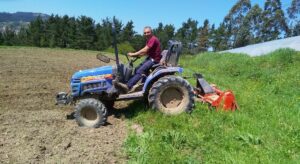
GARIN Eko-Produktuak produce organic vegetables with a focus on sustainability, biodiversity and achieving fair income for farmers. Products are sold via direct sales routes to consumers in the Ajangiz region in the Basque Country.
Name of organisation | Garin production (GARIN Eko-Produktuak) |
|---|---|
Year established | 2017 |
Website | Facebook GARIN Eko-Produktuak |
Location | Ajangiz, Biscay / Local |
Type of organisation | Organic vegetable producer with direct sales network |
Key words | small-scale producer; direct sales; Farmer led; short food supply chains |
Thematic focus | Short Food Supply Chains |
Who is GARIN Eko-Produktuak?
GARIN Eko-Produktuak is a small-scale, family farm that produces organic vegetables in Ajangiz in the Basque Country. They sell their products locally through direct sales networks, both on their farm and in local markets and shops.
Garin Eko-Produktuak looks to produce organic food that increases biodiversity, supports sustainability, allows farmers to earn a decent living, strengthen the local economy and provide healthy food for citizens. They also look to work the land in a respectful way and avoid the use of pesticides and phytosanitary chemicals.
Who do GARIN Eko-Produktuak work with and how do they do it?
Garin Eko-Produktuak work with a number of different actors within their short food supply chains. This includes ENEEK, the Regulatory Council of Organic Agriculture in the Basque Country, as well as other producers who are part of Ehne-Bizkaia. Collaboration with ENEEK supports the growers in terms of the logistics of distribution, planning and organisation. By exchanging with other producers, Garin Eko-Produktuak are able to improve their own production processes and activities, with the objective of implementing and maintaining sustainable productive models and direct sales whilst also earning a decent and stable income.
Many customers buy from Garin Eko-Produktuak because they are concerned about their health and aware of the consequences of industrial farming on the environment. According to the analysis carried out by Garin Eko-Produktuak, the fertility and the diversity of the soil and the farm in general is improving, making the farm easier to pass on to new generations. Consumers are happy with the quality of the products and this is being achieved whilst also meeting the goals of the organisation, as outlined above.
Garin Eko-Produktuak also collaborates with suppliers of the local Allende Salazar school canteen, which helps create awareness and allows local children to have access a healthy, and locally produced diet.
What are GARIN Eko-Produktuak main challenges?
A first challenge is a lack of time and capacity.Those who work in the farming sector generally have a lack of time and capacity to dedicate to tasks that are not directly related to production and distribution, no matter how important they are. Having more opportunities to exchange with other farmers would be beneficial, for example to be able to better plan in a collaborative way to collectively supply school canteens and other consumers.
A second challenge is low prices and low income in the farming sector. Due to the low income and low prices farmers often receive and a lack of market regulation, farming is often not profitable. There needs to be better market access and more marketing tools to support small-scale farmers to sell their products without intermediaries like supermarkets taking a huge, disproportionate share of the profits and pressuring farmers into lower and lower prices.
A third and related challenge is generational renewal and the fact that it is extremely difficult for farmers to access land and markets. Governments and policies on a national and European level support intensive models and not small-scale sustainable farming. One example of this is the distribution of CAP subsidies, which is linked to the number of hectares , and benefits large-scale farmers while encouraging land grabbing. Many of the smaller European farmers are excluded from these subsidies. COVID-19 also demonstrated this bias towards industrial agriculture. Farmers’ markets were closed and small-scale producers were prevented from selling their products at markets or through their usual short supply chains, despite increased demand for local products.
There is a need for structural and integral change, to address the ageing farming population and the lack of generational renewal and new entrants in the profession.
What are the priorities for the GARIN Eko-Produktuak?
The priority is to ensure a fair income for farmers who choose to farm in a way that respects the environment, the land and the local environment and economy. For this to be possible in the long term, for GARIN Eko-Produktuak, it is essential to make policy change that can tackle the issues outlined above, like the ageing population of farmers and low incomes for farmers.